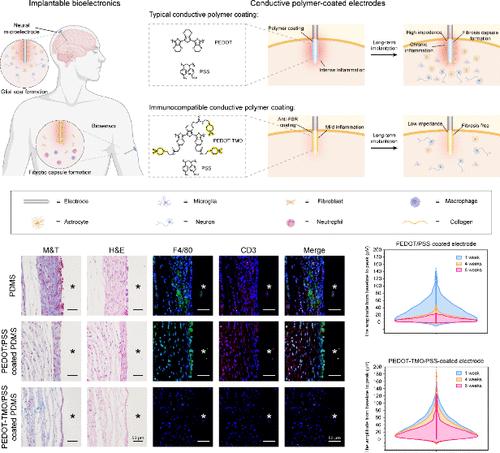An Immunocompatible Conductive Polymer for Long-Term Bioelectronic Implants
IF 15.6
1区 化学
Q1 CHEMISTRY, MULTIDISCIPLINARY
引用次数: 0
Abstract
Tissue-electronic interfaces are vital for neural implants, health monitoring devices, and augmented reality applications; however, the host immune reaction against the electrodes profoundly impacts their durability, precision, and overall fidelity. Building a highly immunocompatible yet conductive interface for implantable electrodes remains a significant challenge. Here, by screening PEDOT derivatives functionalized with diverse immunoregulatory moieties, we identified PEDOT-TMO as a candidate combining superior immunocompatibility with robust conductivity for long-term bioelectronic implants. PEDOT-TMO/PSS coatings exhibit substantially mitigated acute inflammation and chronic fibrotic response following subcutaneous implantation in mice compared to conventional PEDOT/PSS, while preserving its original electrochemical properties. During extended in vivo brain implantation trials in freely moving rat models, we observed that the immunocompatible conductive polymer-coated silicon electrode can reliably record electrophysiological signals for at least 8 weeks, demonstrating significantly better performance compared to PEDOT/PSS-coated and bare electrodes. Notably, the PEDOT-TMO/PSS interface substantially reduced the expression of S100A9 in surrounding brain tissue. Pharmacological inhibition of S100A9 similarly attenuated tissue responses to brain implants, suggesting a target for neuroinflammation inhibition. The new type of immunocompatible conductive polymer reported here holds promise in enhancing and extending the long-term function in a range of bioelectronic devices by attenuating local immune responses to functional bioelectrodes.

用于长期生物电子植入物的免疫相容导电聚合物
组织电子接口对于神经植入、健康监测设备和增强现实应用至关重要;然而,宿主对电极的免疫反应深刻地影响了它们的耐用性、精度和整体保真度。为植入式电极构建高度免疫兼容且导电的界面仍然是一个重大挑战。在这里,通过筛选具有不同免疫调节基团功能化的PEDOT衍生物,我们确定PEDOT- tmo是具有优越免疫相容性和强大导电性的长期生物电子植入物的候选材料。与传统的PEDOT/PSS相比,PEDOT- tmo /PSS涂层在小鼠皮下植入后显着减轻了急性炎症和慢性纤维化反应,同时保留了其原有的电化学性能。在自由运动大鼠模型的体内植入试验中,我们观察到免疫相容导电聚合物包覆硅电极可以可靠地记录至少8周的电生理信号,与PEDOT/ pss包覆和裸电极相比,表现出明显更好的性能。值得注意的是,PEDOT-TMO/PSS界面显著降低了周围脑组织中S100A9的表达。S100A9的药理抑制类似地减弱了组织对脑植入物的反应,提示神经炎症抑制的靶点。本文报道的新型免疫相容导电聚合物有望通过减弱对功能性生物电极的局部免疫反应来增强和扩展一系列生物电子器件的长期功能。
本文章由计算机程序翻译,如有差异,请以英文原文为准。
求助全文
约1分钟内获得全文
求助全文
来源期刊
CiteScore
24.40
自引率
6.00%
发文量
2398
审稿时长
1.6 months
期刊介绍:
The flagship journal of the American Chemical Society, known as the Journal of the American Chemical Society (JACS), has been a prestigious publication since its establishment in 1879. It holds a preeminent position in the field of chemistry and related interdisciplinary sciences. JACS is committed to disseminating cutting-edge research papers, covering a wide range of topics, and encompasses approximately 19,000 pages of Articles, Communications, and Perspectives annually. With a weekly publication frequency, JACS plays a vital role in advancing the field of chemistry by providing essential research.

 求助内容:
求助内容: 应助结果提醒方式:
应助结果提醒方式:


